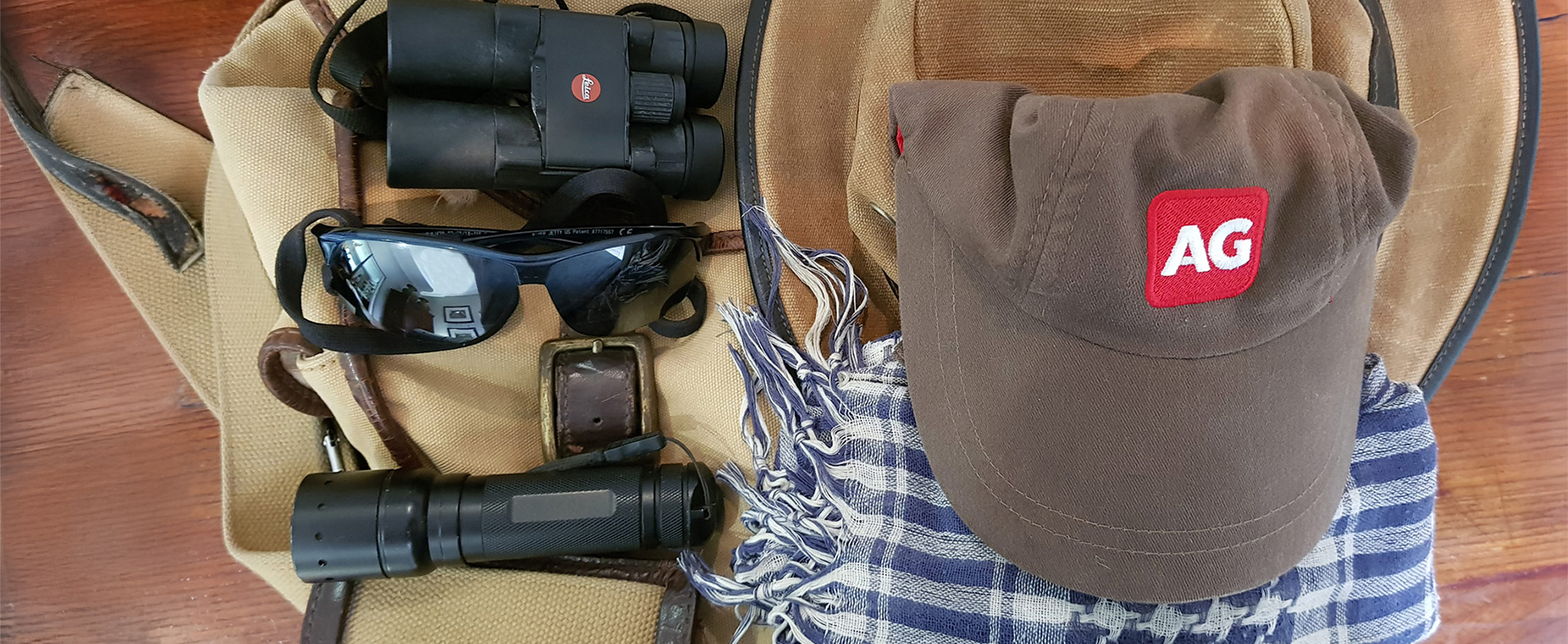Safari experts & storytellers. Since 1991
Trust us to find you the rarest animals, the most spectacular wildlife events, the remotest landscapes and deeply meaningful cultural encounters!
Here’s our essential list of items to pack for an African safari
It’s one of our most frequently asked questions, and certainly one of the most Googled safari FAQs: “What should I pack for a safari?”
Fortunately, the answer to this question is a relatively simple one – though it is nuanced. Safari packing requires neutral layers, sun protection, insect repellent, headlamp, and soft bags meeting strict 15–20kg aircraft limits.
Check out what we recommend for travelling in Africa, whether to East, Central or Southern Africa:
HOT TIP: Many safari destinations involve flights on small aircraft with strict baggage restrictions – often just 15-20kg in soft-sided bags. This limitation is a liberation from over-packing, forcing you to focus on the essentials that truly matter.
Get our comprehensive packing guide, delivered straight to your inbox
What to pack for your safari: essential items for your adventure
From clothes to photography gear and healthcare; what to pack and what to leave - get our complete list, created by safari experts, sent straight to your inbox.
What should I wear on safari?
Safari packing is strategic minimalism: every item earns its place through purpose. Comfortable, casual clothes in muted colours work best: think desert beiges, acacia greens, and riverbed khakis – tones that help you blend into the background, whether on a walking safari or a game drive.
Think in layers: game drives begin in pre-dawn darkness and warm gradually as the sun climbs. Long-sleeved shirts are great for protecting against both wind chill in the open game-drive vehicle, and for keeping your skin safe from the sun and insect bites. Pack cotton t-shirts, long socks for bug protection, a light scarf or buff for dust and sun protection, plus a quality hat for the African sun. For cooler mornings and evenings, include jeans or trousers. During cooler months, pack jackets, sweaters, and gloves. A lightweight waterproof jacket is useful for afternoon downpours. Don't forget swimwear and comfortable walking shoes – heels and dress shoes have no place in the bush. Finally, many lodges offer laundry services, so you can pack light.
Wellness
The African wilderness may test your body! Pack SPF 50+ sunscreen & after-sun care as daily armour. If you wear contact lenses, bring backup glasses – Africa's dust finds every gap. Though the lodges will provide amenities, it’s best to bring your own insect repellent, & to speak to your doctor about taking anti-malarial prophylaxis (if applicable). Include hydrating skincare for dry climates. Quality lip balm with SPF protection is essential, & electrolyte supplements help during active days.
Sunscreen (SPF 50+) & after-sun care
Eyeglasses (for contact-lens wearers)
Safe insect repellent
Medical kit + anti-malarial prophylaxis
Hydrating skincare for dry climates
Quality lip balm with SPF
Electrolyte supplements
Practical items
Exploring the bush can be taxing, and some of the best sightings and experiences take time (like one of our safari experts who waited over 2 hours to witness the first of 6,000 wildebeest cross the Bologonja River). An insulated water bottle is an easy way to make sure you have a refreshing cold drink at any time, and any temperature.
Many of our more remote lodges don’t have outside lights (to prevent light pollution and to lessen their impact on the environment), so a quality headlamp proves indispensable for pre-dawn adventures.
We also recommend packing portable phone chargers and power banks, storing any critical documents in waterproof pouches, and preparing cash in small denominations with envelopes for meaningful tips.
Photography & observation
Most photographers will have their go-to kit, but we know from years of photographing while on safari, and from feedback from our photographers in our annual Photographer of the Year competition, that a good zoom lens, and some help stabilising yourself with something like a bean bag, can make or break your images.
HOT TIP: bring an empty bean bag with a zip and fill with sand or rice when you arrive at the lodge
Professional or high-end mirrorless camera with versatile zoom lens (24-200mm minimum)
Quality binoculars (8x42 or 10x42)
Nice to have: Stabilising bean bag or lightweight tripod.
Weather-sealed camera bag
Extra batteries and high-capacity memory cards
"The only man I envy is the man who has not yet been to Africa – for he has so much to look forward to." - Richard Mullin
Pack with intention, travel with purpose, and prepare to return fundamentally changed. In Africa, you don't just witness the greatest show on Earth – you become part of it.
Basic outfit essentials
Shirts with long sleeves (sun & insect protection) | Shorts or a light skirt (short skirts aren’t practical) |
T-shirts and cotton blouses | Lightweight waterproof jacket |
Long socks as bug protection | Swim- and beach-wear |
Light scarf or buff for dust | Hat, cap or beanie, for sun & wind |
Comfortable walking shoes & sandals (heels aren’t recommended) | Underwear – roads are bumpy, so suitable women’s attire (eg. a sports bra) is recommended |
Jeans or safari trousers for evenings & cooler days | Formal attire (for prestigious hotels/luxury trains) |
Jackets, sweaters, a scarf & gloves: for early morning & evening game drives during winter | Comfortable, breathable sleepwear – temperatures can drop at night, even indoors |
Practical items to bring on safari:
Insulated water bottle (eg. stainless steel) |
Ear plugs |
Quality headlamp |
Portable phone charger and a power bank |
Cash in small denominations (+ envelopes) for tips |
Notebook and pencil |
Relevant bird book or app – ask us for recommendations |
Compact first-aid kit with personal medication and basic supplies (plasters, antiseptic wipes, painkillers, antihistamines). |
Ziplock bags of various sizes |
Tissues / hand wipes / sanitiser. Pack a spare toilet roll, just in case |
Travel pillow |
Sweat/gym towel |
Padlocks / cable ties to lock your luggage |
Lightweight backpack to carry essentials on walking safaris |
Tote bag / waist bag |
Relaxing entertainment – sketch book, Kindle, books, magazines |
Waterproof document pouch with copies of your passport, visas and other key documents |
Country-specific plugs and adaptors |
Would you like help planning your dream safari? We can help!
Thanks for considering Africa Geographic while planning the best African safari experiences!
The best African safaris are about knowing what, when and where to go and with whom – for the ultimate safari experience. A few weeks too early/late or a few kilometres off course, and you could miss the greatest show on Earth. And wouldn’t that be a pity? Our tailor-made safaris are made for you, with love, by our crew of passionate safari experts who have lived and worked in Africa for most of their lives.
Safari ideas
Check out some epic safaris to Africa here:
Safari planning
—
Your dream African safari
Tell us about your dream trip - our travel experts will craft a no-obligation itinerary just for you. We have crafted over 5,000 safaris since 1991. Your personal details are protected; we only use this information to contact you.

Why choose us to craft your safari?
Handcrafted experiential safaris since 1991.
Travel in Africa is about knowing when and where to go, and with whom. A few weeks too early/late or a few kilometres off course, and you could miss the greatest show on Earth. And wouldn’t that be a pity?

Trust & Safety
Guest payments go into a third-party TRUST ACCOUNT - protecting them in the unlikely event of a financial setback on our part. Also, we are members of SATSA who attest to our integrity, legal compliance and financial stability.
Make a difference
We donate a portion of the revenue from every safari sold to carefully selected conservation projects that make a significant difference at ground level.
YOUR safari choice does make a difference - thank you!

